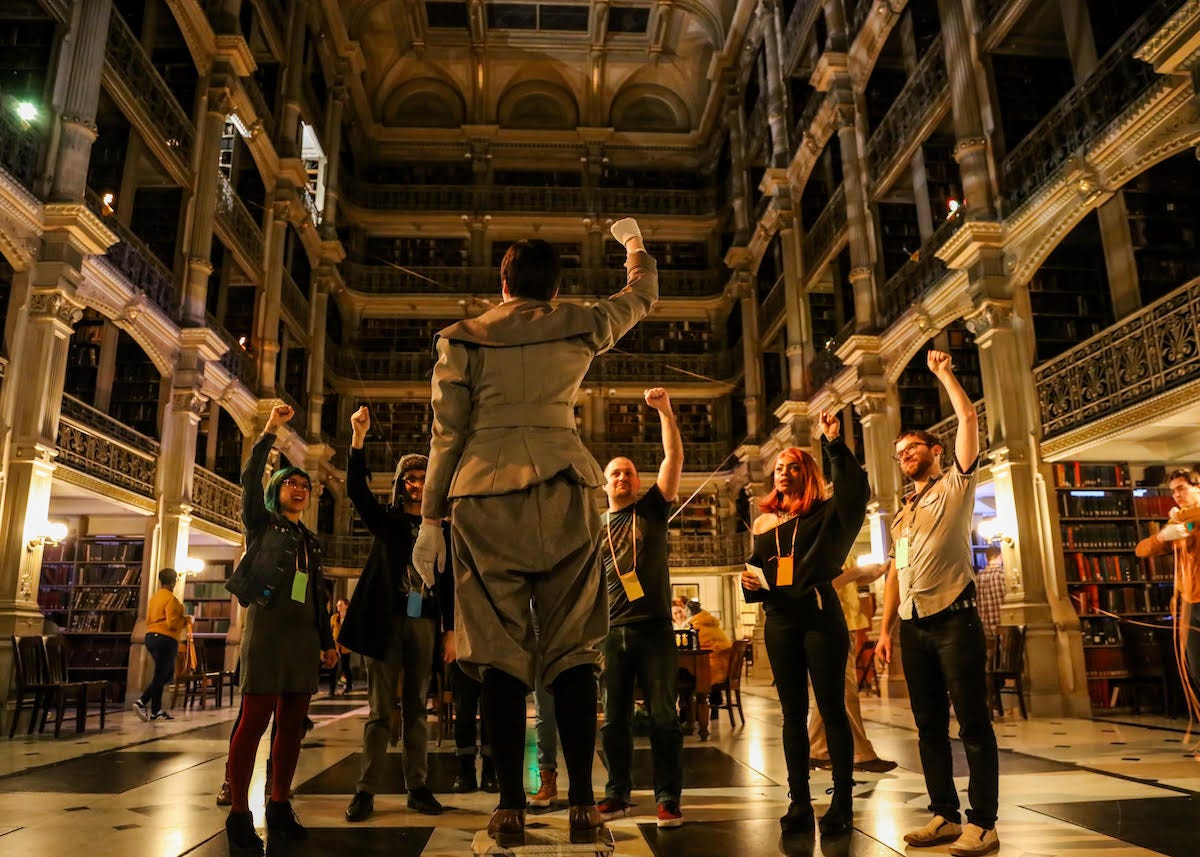
I never really knew my grandmother Karola personally because she died when I was a baby. My father never spoke in detail about her, but I gathered enough bits and pieces through the stories my family would tell to construct a rich sketch of her. She was tough as nails. She had a difficult, painful life, surviving the Holocaust and losing almost everyone, but she was a survivor. She was a classy woman, a real lady, fond of museums, and opera, and art, and literature. And finally, there was her greatest passion: science. Karola was a nuclear chemist at the dawn of nuclear chemistry. With her colleagues at the University of Chicago, she helped develop the first nuclear reactor, the Chicago Pile-1. Household names in nuclear science like Enrico Fermi changed my father’s diapers. A small graphite filter from that reactor still sits on our living room mantle. But Karola wasn’t a household name, though. She’s not really even remembered outside our family — Googling her name provides nothing of substance.
Me, I haven’t done anything I believe history will remember yet. But as a cisgender man, I have a comfort in knowing that when — and if — the time comes, it will be preserved. It was certainly harder to work in any male-dominated industry as a woman or non-binary person in the past. And our canonical version of history and culture doesn’t reflect those who managed to do so anyway. A few names slip through, here and there. We are taught a little about Madame Curie. Hollywood has made Katherine Johnson a public figure. But there are whole fields where women pioneers remain forgotten. Take, for example, electronic music. We all remember Robert Moog for his namesake synthesizer, but we forget his collaborator (and a spectacular composer in her own right) Wendy Carlos. We also ignore as a culture (forgetting if not deliberately, then something approaching it) Daphne Oram, the undisputed mother of electronic music.
It’s appropriate, then, that electronic music provides the soundscape for See Also, Submersive Productions’ immersive tribute to the forgotten women of history. Taking place in Johns Hopkins’ historic Peabody Library, it mixes dance with one-on-one and small group interactions, distributed by the sections of the library. Characters are, for the most parts, composites of the women featured in the Johns Hopkins Sheridan Libraries and University Museums. The audience is free to wander sandbox-style through the interactions with full cast movement pieces punctuating the experience.
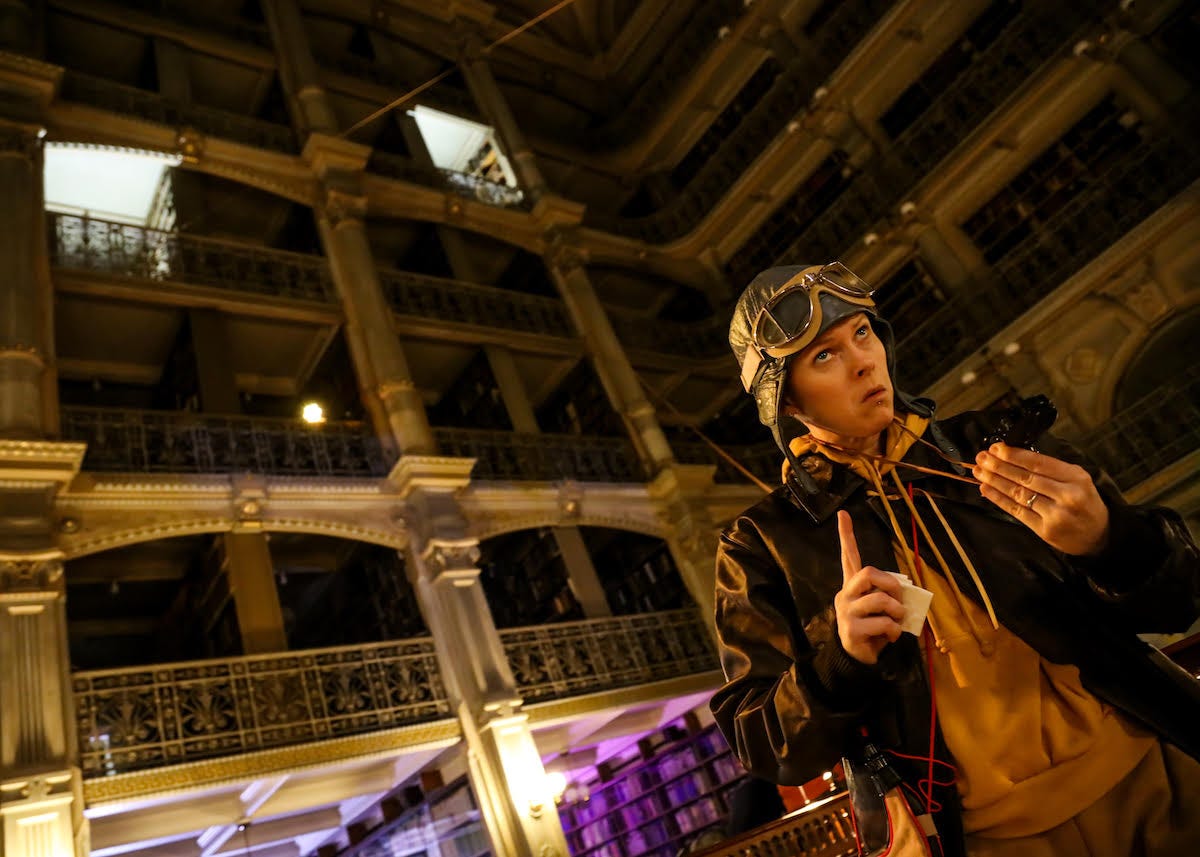
Step into “cookbooks” and let the All Mother (Betse Lyons) unburden you of your troubles, by either holding a secret so you don’t have to suffer alone, or washing away a regret. Sit with the aforementioned Electronic Music Pioneer (Natanya Washer), styled after Carlos in a sleek 70s jumpsuit, as she guides you through an audio meditation. As you experience each encounter, connections start to appear, both literally and figuratively — as the story becomes clearer to the audience, roped off sections are opened and huge spools of ribbon begin to connect every section and floor of the library. Literal boundaries collapse, with reams of saffron colored ribbons forming new connections, making the staid library feel closer to a delightful circus by the end.
Get Blake Weil’s stories in your inbox
Join Medium for free to get updates from this writer.
SubscribeSubscribe
It’s that sense of connection, established from the minute we walk in the door, that allows the piece to work without feeling didactic. Everyone receives a brief personality quiz, which gives them a library card for a specific book as their ticket for entry. On each card, the audience writes their name, seeing all who came before them. The opportunity to make these little marks continues throughout the show in the book of names I was asked to write in. First, my own name. Then, more esoteric names, names I find fascinating, the name of my first love. We settle for a moment on names of those no longer with us. Glancing at the page, it’s nice to see all the names written down, here in one of the grandest libraries I’ve ever visited.
Here, in this book, they’re canonized, preserved as something worth remembering. I know this is where Karola belongs.
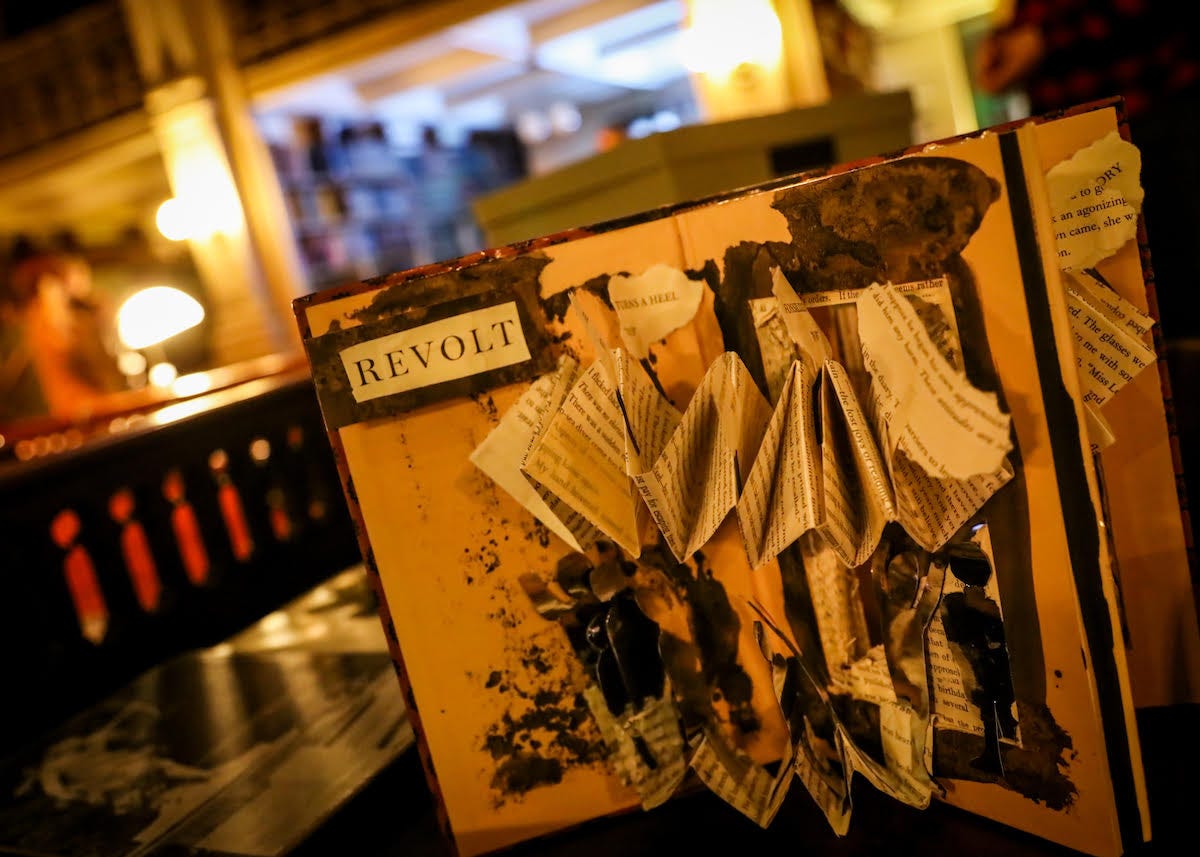
We were also asked to scrawl a symbol on a ribbon, representing our hopes for a more egalitarian future. That ribbon, with all our sigils scribbled on it, led us neatly into the show’s next big theme. For the ribbon to have enough space on the table, the audience has to pick what to discard from the table to make room. We each said aloud something we wanted to discard from the world; I said “prejudiced expectations.” Immediately, I’m presented with a catalog card, a clear antique from the library’s history (or a truly excellent facsimile), for a book on the “lesser potential of the uncivilized races.” I’m also presented with an enormous pair of shears to destroy it with, or welcomed to use my hands, if that felt better.
The message is obvious but the transgression is deliciously cathartic. Forget our norms; some of them are what have been holding us back from progress, kindness, and truth.
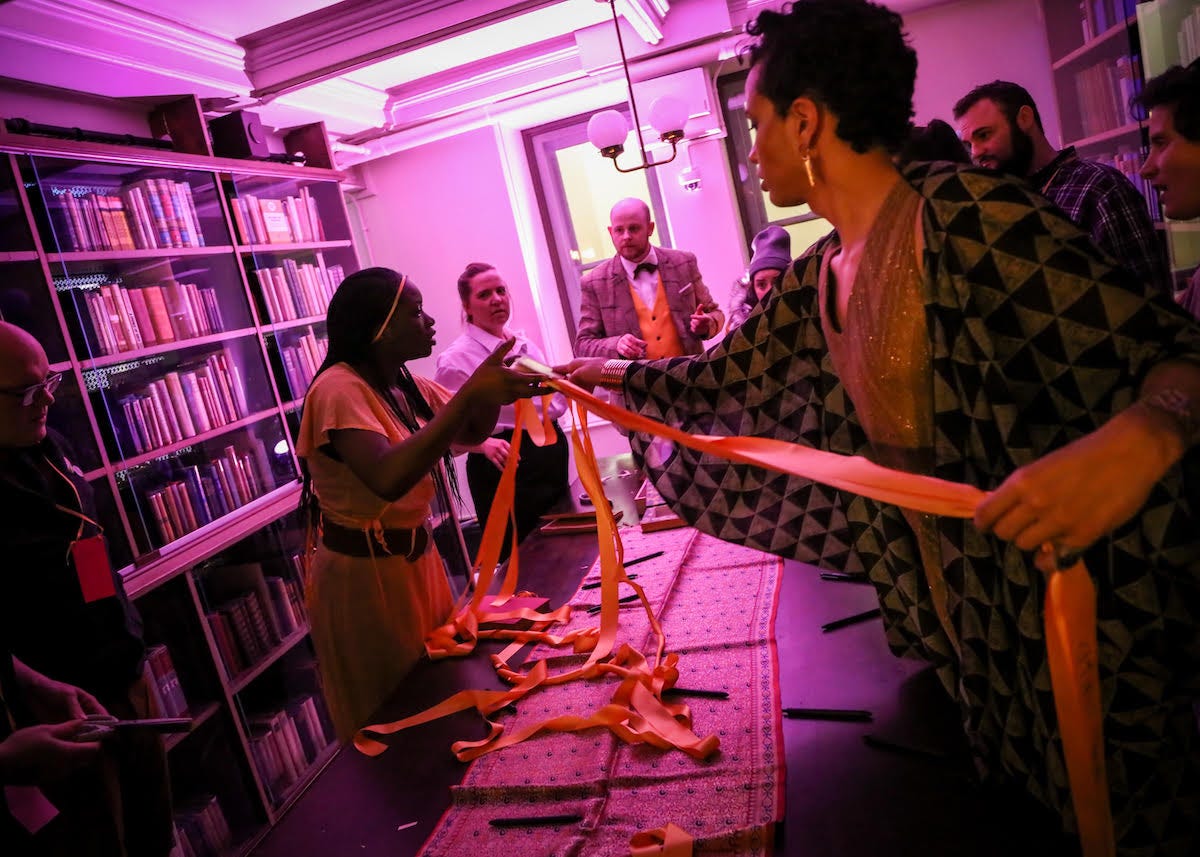
That transgression in the name of something better and refusal to defer to the forces that say otherwise, is carried through the show by a handful of present-day characters present in the library. Assorted librarians shush us, such as when the Suffragette, giving a cheeky grin, leads us in a game of “Simon Says” that turns quickly into a protest march. It’s a big risk to give an audience contradictory instructions (March! Stay put! Shout! Shhh!), but the audience responds with grace and understanding. It’s a pretty small act of civil disobedience to shout in a library, but it resonates well.
All of this would be fine on its own: a sandbox show training its audience to remember who doesn’t have a seat at the table and to act boldly in righting that injustice. It was the loveliness of the show’s looping structure that adds a hopeful note of grace and elevates See Also to something special. As I mentioned earlier, the world of the show, taking place in the library, changes through the course of the experience. Ribbons unspool as new connections are found, remaining in place. While the women of history stay the same, beacons in the past, the present day characters begin to soften and become kinder and more inclusive. By illustrating the agents of the status quo not as malicious, but as misguided traditionalists capable of change, the show ends up being a joyous herald of a better possible tomorrow, rather than an (admittedly deserved) rage at the injustices of the present.
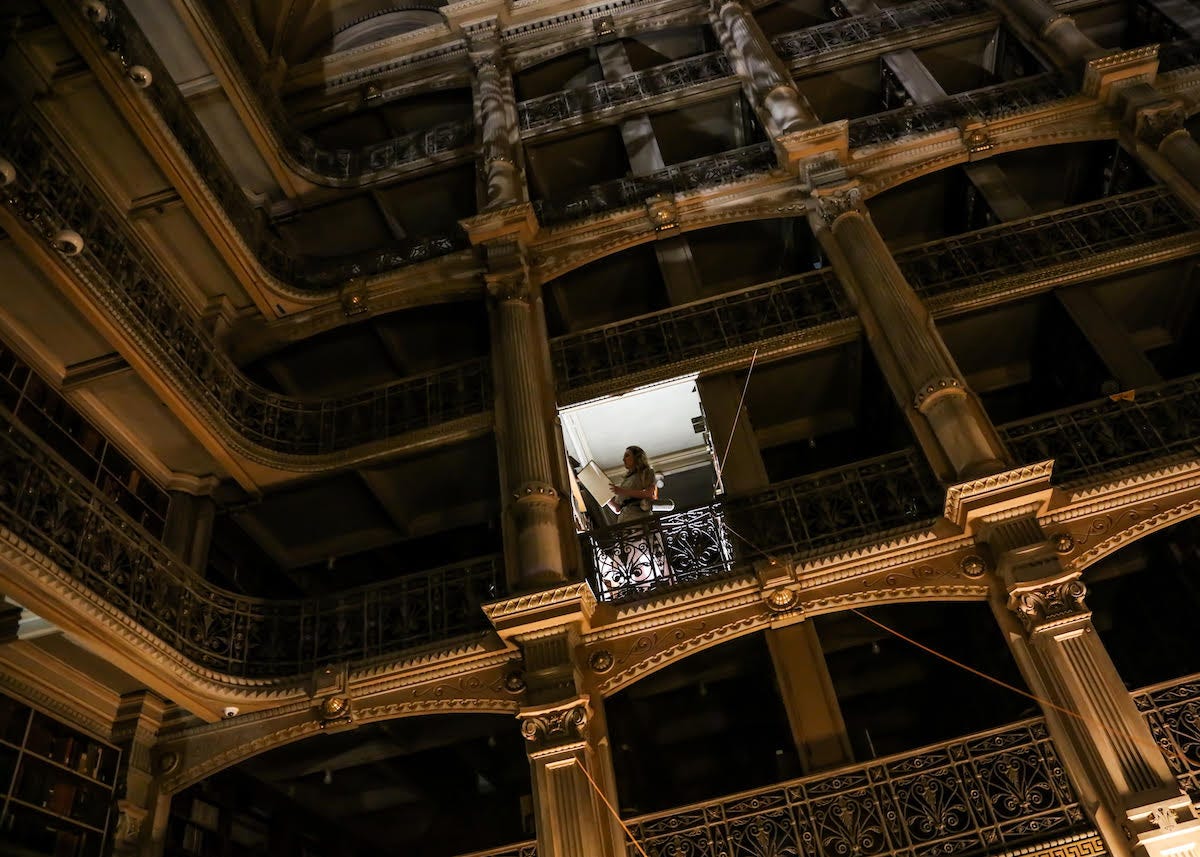
Throughout the show, the curator of the library (David Brasington) attempts to chase out a seemingly homeless woman (Caitlin Weaver) who is just enjoying the library for its warmth and beauty. As the show closes, he gives her a pillow and tucks her in, allowing her a safe space to rest for the night. A woman in a black veil (Elizabeth Ung) folds her book, the one I wrote Karola’s name in, and retreats into the stacks of the library. We share a glance and a smile, and I turn to leave. Sure, the past hasn’t changed, but by shifting the lens of memory, the present has. The library stands as we left it, connections and inspirations intact. Even if in an evening’s fiction, Karola sits among the world-changing women she deserves to be among.
There’s more work to do in the morning, to be sure, but tonight on their drives home, I, and I believe every member of the audience, celebrates a little victory.
See Also has concluded.
NoPro is a labor of love made possible by our generous Patreon backers. Join them today!
In addition to the No Proscenium web site, our podcast, and our newsletters, you can find NoPro on Twitter, Facebook, YouTube, Instagram, in the Facebook community Everything Immersive, and on our Slack forum.
Office facilities provided by Thymele Arts, in Los Angeles, CA.



















Discussion